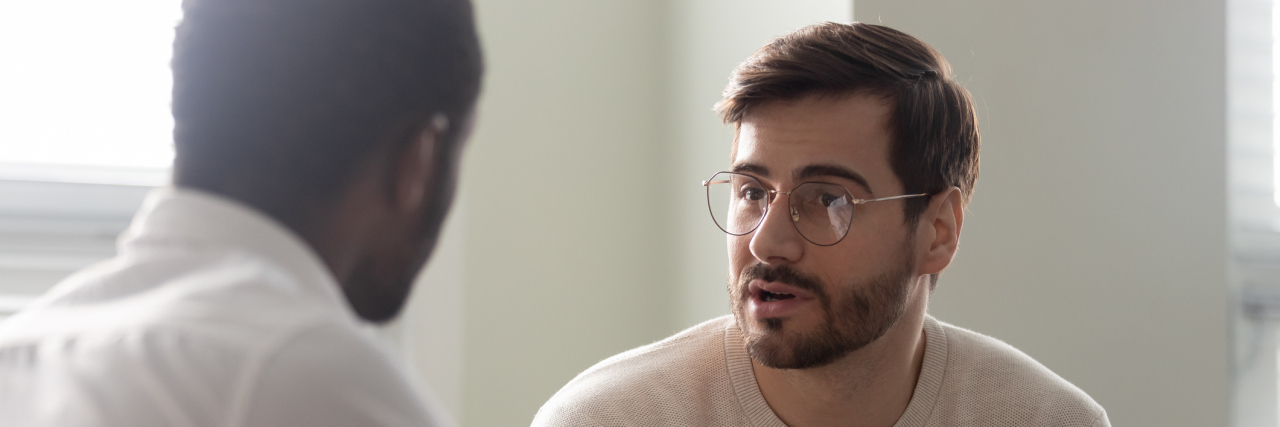In my opinion, trust is the most important quality to have in any relationship. Whether the relationship is with a boyfriend, girlfriend, teacher or even an auto mechanic, trust should be established early on in the relationship. For a mental health patient, trusting your psychiatrist or psychologist is crucial in recovery. You don’t have to be best friends, but you should be able to trust whoever is evaluating your progress.
How can you build trust with your doctor?
When I am seeing a new doctor, I want to start building trust immediately. Most of the time, my psychiatrist inquires about how my medication is working for me. He asks me if I am taking the proper dosage and if I am having any symptoms. If I have other questions that I want to go further in depth about, I usually reserve those questions and comments for my psychologist. She acts more like a counselor for me, and allows me to talk through any issues I might be having.
When I am having conversations with my doctors, I try not to be distracted by what’s going on outside, the sound of my doctor typing on her computer or the fact I might be hungry. I want to focus so I do not waste his time. I want to be respectful of my doctor’s time, knowing he has many other veterans to see just that day alone. Both of my doctors, my psychiatrist and my psychologist, work very closely together as a team to give me the best treatment.
One of the qualities that has helped me build trust with my doctors happens when I first enter the office. Does their voice sound gentle or friendly, enabling me to open up to them? I can usually tell if a doctor is stressed out or having a bad day with their greeting to me as I enter the office. For me, their voice indicates whether they have time for me, or if they are just waiting for lunch, the end of the workday or are occupied with something else.
Eye contact helps, too. There is an old quote attributed to Paulo Coelho that says: “The eyes are the mirror of the soul and reflect everything that seems to be hidden; and like a mirror, they also reflect the person looking into them.”
The time of the day when I meet my doctor is important, too. I am not a morning person. I need to have coffee and some food before I can function properly. I feel sure the same is true with my doctors. In the mornings, I sometimes still am tired from the side effects of my medication, making me not at my best.
At the beginning of the day, the doctor may seem more upbeat. If it is during the end of the day, the doctor may seem tired or even apathetic. If the patient has waited a long time to talk to the doctor, the patient may seem ignored or apathetic as well. Both doctor and patient have to build the bridge for a positive experience in recovery. Whether it is coffee or food in the belly, both doctor and patient have to be upbeat and friendly.
I don’t take for granted meeting with my doctor. Honest with symptoms, do I need a change in my meds? I have to be honest with myself so I can be honest with the doctor. Doctors’ time is valuable, so I try to write down my questions, so I will not take too much time. My doctor’s voice indicates his patience with me.
What has helped me sometimes is doing my own research. Since I have been diagnosed with schizophrenia, I have tried to do as much research on this illness as possible. The internet has been a valuable tool in my search for answers. My psychologist has encouraged me to learn as much as possible about myself. Building trust means answering all questions honestly. My doctors are there to help, and I can help them to help me by being honest.
I accept that people do judge a book by its cover. I want to present the best possible “me” to my doctors. Good grooming habits show respect not only for myself, but for my doctor who is spending time with me. Having been homeless and even broke, I understand this isn’t always a possibility. Despite what I have been through, I am still alive, so I want to show some pride, sit up straight and make eye contact.
The more I share honestly of myself, the more my relationship with my doctors will grow, and it is also possible to see my doctor professional friends.
A version of this article originally appeared in Schizophrenia Bulletin, Volume 46, Issue 2.
Getty image by fizkes

